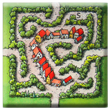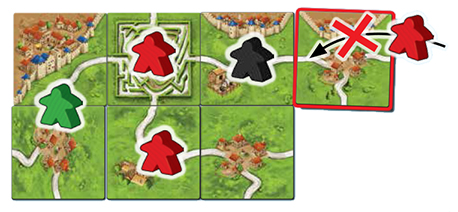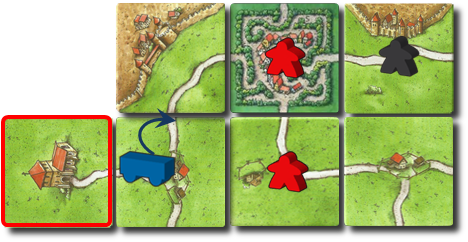Difference between revisions of "The Labyrinth"
Meepledrone (talk | contribs) (Creation) |
Meepledrone (talk | contribs) (Change wording to C2 style) |
||
| Line 28: | Line 28: | ||
=== Placing a tile === | === Placing a tile === | ||
If you draw a labyrinth, you place it according to the normal rules. | |||
=== Placing a | === Placing a meeple === | ||
==== Basic rules ==== | ==== Basic rules ==== | ||
When you place a labyrinth tile, you are allowed to put a meeple on it (also in compliance with the standard rules). The labyrinth is '''not''' a crossing; all outgoing roads are interconnected. Consequently, a meeple can only be placed on it if all the roads connected to the labyrinth tile are unoccupied. <ref> | |||
{{IconWorld}} | {{IconWorld}} | ||
A | A meeple can be placed on an incomplete labyrinth network by other means if unoccupied: a wagon can move from a completed neighboring feature or a flier can land on any tile of the labyrinth network. | ||
</ref> | </ref> | ||
The | The meeple then is a thief on all the connected roads. | ||
==== Advanced variant ==== | ==== Advanced variant ==== | ||
Since the labyrinth makes the connections of the roads quite unmanageable, the placing of | Since the labyrinth makes the connections of the roads quite unmanageable, the placing of meeples is regulated differently in this variant. If you place the labyrinth, you may place a meeple on it even if there is already a meeple on one or more connected roads. <ref> | ||
{{IconWorld}} | {{IconWorld}} | ||
A | A meeple can be placed on an incomplete labyrinth network by other means: an unoccupied labyrinth tile or road segment can be occupied by a wagon moving from a completed neighboring feature or a flier. <br />[[File:Abbey_And_Mayor_C1_Wagon_Clarification_01.png|frame|none|'''Example:''' A wagon moves to an unoccupied road brach of an incomplete labyrinth when applying using '''The Labyrinth''' advanced rules]] | ||
</ref> It does not matter who owns those | </ref> It does not matter who owns those meeples. | ||
[[File:Labyrinth_C2_Example_01.jpg|frame|none|{{ColorRed| | [[File:Labyrinth_C2_Example_01.jpg|frame|none|{{ColorRed|You}} place the labyrinth next to a road that connects with it. Although there is already a meeple on this road, you may place a meeple on the labyrinth.]] | ||
As the game | As you progress through the game, if you place a tile at an exit of the labyrinth that does not have a meeple yet, you may place a meeple there, even though the network of roads and the labyrinth itself may have a meeple. | ||
[[File:Labyrinth_C2_Example_02.jpg|frame|none|{{ColorGreen| | [[File:Labyrinth_C2_Example_02.jpg|frame|none|{{ColorGreen|Green}} later adds a road to an unoccupied labyrinth exit. He too is allowed to use a meeple, although meeples are already on the labyrinth and the adjacent roads.]] | ||
If | If you add a road to an existing road that already has a meeple on it, a meeple cannot be placed on it (as usual.) The labyrinth and the four outgoing roads are the exceptions. | ||
(as usual.) The labyrinth and the four outgoing roads are the exceptions. | |||
[[File:Labyrinth_C2_Example_03.jpg|frame|none|{{ColorRed| | [[File:Labyrinth_C2_Example_03.jpg|frame|none|{{ColorRed|You}} later attach a road to a labyrinth exit. Since there is already a black meeple, you may not place a meeple on the road.]] | ||
=== Scoring === | === Scoring === | ||
| Line 66: | Line 65: | ||
==== Advanced variant ==== | ==== Advanced variant ==== | ||
===== Scoring a Feature ===== | |||
[[File:Labyrinth_C2_Example_04.jpg|frame|none|All the roads are completed. {{ColorRed| | The labyrinth and the connected roads are scored when all 4 of the roads are completed. The player with the majority of meeples on the labyrinth and the connected roads will get 1 point for each tile as usual. In addition, he or she will get 2 points for each meeple standing on the labyrinth or on a connected road. If several players have the majority, each of them gets the full number of points. | ||
[[File:Labyrinth_C2_Example_04.jpg|frame|none|All the roads are completed. {{ColorRed|You}} and {{ColorBlack|Black}} are tied for majority. {{ColorRed|You}} and {{ColorBlack|Black}} get '''8 points''' for the tiles and '''10 points''' for the 5 meeples on the tiles. Altogether you each get 18 points.]] | |||
===== Final Scoring ===== | |||
The labyrinths are scored according to the normal Carcassonne rules for roads. You get no additional points from the meeples placed on the labyrinth network. | |||
== Tile distribution == | == Tile distribution == | ||
Revision as of 14:59, 14 October 2018
General info and comments
The Labyrinths was originally release by Spiel Doch in 2016.
Issue 1/2016 of the Spiel Doch! magazine contains two new tiles for Carcassonne. One has been illustrated in the style of the 1st edition by Doris Matthäus, the other in the style of the 2nd edition by Anne Pätzke. Both tiles can be used in all editions. The combinations with other expansions and mini-expansions are not completely tested and there are no official rule explanations covering such cases.
Spiel Doch provided a basic set of rules and HiG released a variant for advanced players available on their website at the tile of release.
Contents
- 2 landscape tiles, one 1st Ed. Carcassonne and another for 2nd Ed. Carcassonne
Rules
Preparation
Mix the Labyrinth tiles with the other landscape tiles.
Placing a tile
If you draw a labyrinth, you place it according to the normal rules.
Placing a meeple
Basic rules
When you place a labyrinth tile, you are allowed to put a meeple on it (also in compliance with the standard rules). The labyrinth is not a crossing; all outgoing roads are interconnected. Consequently, a meeple can only be placed on it if all the roads connected to the labyrinth tile are unoccupied. [1] The meeple then is a thief on all the connected roads.
Advanced variant
Since the labyrinth makes the connections of the roads quite unmanageable, the placing of meeples is regulated differently in this variant. If you place the labyrinth, you may place a meeple on it even if there is already a meeple on one or more connected roads. [2] It does not matter who owns those meeples.
As you progress through the game, if you place a tile at an exit of the labyrinth that does not have a meeple yet, you may place a meeple there, even though the network of roads and the labyrinth itself may have a meeple.
If you add a road to an existing road that already has a meeple on it, a meeple cannot be placed on it (as usual.) The labyrinth and the four outgoing roads are the exceptions.
Scoring
Basic rules
The labyrinths are scored according to the normal Carcassonne rules for roads.
Advanced variant
Scoring a Feature
The labyrinth and the connected roads are scored when all 4 of the roads are completed. The player with the majority of meeples on the labyrinth and the connected roads will get 1 point for each tile as usual. In addition, he or she will get 2 points for each meeple standing on the labyrinth or on a connected road. If several players have the majority, each of them gets the full number of points.
Final Scoring
The labyrinths are scored according to the normal Carcassonne rules for roads. You get no additional points from the meeples placed on the labyrinth network.
Tile distribution
Total Tiles: 2
Footnotes
For Icons explanation and licensing please visit Icons page.
- ↑
 A meeple can be placed on an incomplete labyrinth network by other means if unoccupied: a wagon can move from a completed neighboring feature or a flier can land on any tile of the labyrinth network.
A meeple can be placed on an incomplete labyrinth network by other means if unoccupied: a wagon can move from a completed neighboring feature or a flier can land on any tile of the labyrinth network.
- ↑
 A meeple can be placed on an incomplete labyrinth network by other means: an unoccupied labyrinth tile or road segment can be occupied by a wagon moving from a completed neighboring feature or a flier.
A meeple can be placed on an incomplete labyrinth network by other means: an unoccupied labyrinth tile or road segment can be occupied by a wagon moving from a completed neighboring feature or a flier.








